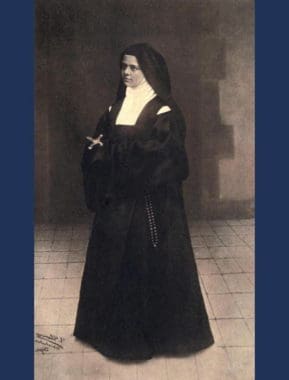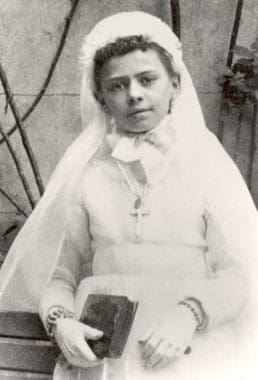 Editor’s Note: Today, we are most pleased and honored to introduce to you another author who has joined our team of writers. Some of you may already know her from her work as an professor for the Avila Institute. Please join us in warmly welcoming Julie Enzler today and make her feel at home.
Editor’s Note: Today, we are most pleased and honored to introduce to you another author who has joined our team of writers. Some of you may already know her from her work as an professor for the Avila Institute. Please join us in warmly welcoming Julie Enzler today and make her feel at home.
To Live As a Praise of Glory
 St. Elizabeth of the Trinity (she has already been declared a saint and her canonization Mass will be celebrated this October 16th) is “the other” young, French Carmelite from the turn of the century. I personally ‘met’ her, in fact, while searching for a book on St. Thérèse of Lisieux. And yet, as is true with each of the saints, she has her own unique contribution to the Church that merits devotion and prayerful application in our own lives.
St. Elizabeth of the Trinity (she has already been declared a saint and her canonization Mass will be celebrated this October 16th) is “the other” young, French Carmelite from the turn of the century. I personally ‘met’ her, in fact, while searching for a book on St. Thérèse of Lisieux. And yet, as is true with each of the saints, she has her own unique contribution to the Church that merits devotion and prayerful application in our own lives.
She is perhaps best known for her profound experience of the indwelling of the Holy Trinity in her soul. And her most celebrated teachings are those on contemplative prayer, but there is even more to discover in her writings, and perhaps her most sublime teachings have only begun to be appreciated and applied in the quietest hearts in the quietest monasteries throughout the world. Yet she is most definitely a saint for the lay faithful as much as for cloistered contemplatives. Many of her letters were written to her lay friends and one of her four major works was a ten-day retreat called Heaven in Faith [HF] that she wrote for her younger sister, a married laywoman.
May her divinely inspired understanding of the Scriptures and her spiritual wisdom enlighten our hearts and encourage us to join with her in love of the Divine Three, God – All Love.
“In Christ, we have also obtained an inheritance, having been destined according to the purpose of him who accomplishes all things according to his counsel and will, so that we, who were the first to set our hope on Christ, might live for the praise of his glory.” (Ephesians 1:11-12)
The Call to be a Praise of Glory.
 A few months before her death, St. Elizabeth of the Trinity wrote the retreat for her younger sister, Marguerite. In her reflections, she explained her own understanding of this baptismal vocation to become perfect Praises of Glory. At the time, her sister was a young wife and the mother of an infant and a toddler. St. Elizabeth wanted to teach her sister how she could be united to Christ through prayer in the midst of her daily responsibilities. St. Elizabeth had herself lived as a contemplative in the world before entering the Carmelite monastery.
A few months before her death, St. Elizabeth of the Trinity wrote the retreat for her younger sister, Marguerite. In her reflections, she explained her own understanding of this baptismal vocation to become perfect Praises of Glory. At the time, her sister was a young wife and the mother of an infant and a toddler. St. Elizabeth wanted to teach her sister how she could be united to Christ through prayer in the midst of her daily responsibilities. St. Elizabeth had herself lived as a contemplative in the world before entering the Carmelite monastery.
The stated goal of the retreat is to “make us more like our adored Master… to become so one with Him that we may say: ‘I live no longer I, but He lives in me. And the life that I now live…I live in the faith of the Son of God.'” (Galatians 2:20, HF 8.2, 28). By twice daily prayers, reflecting upon and explaining what she understands to be the main characteristics of a Praise of Glory, St. Elizabeth charts a course for souls desiring this Pauline conformity to Christ.
Surrendered to God.
First of all, she says, a Praise of Glory is surrendered to God in order to accomplish His will. This surrender is made as an act of pure love for God. But God is a demanding lover, as St. Elizabeth writes, “Now the love of Christ is generous. All that He has, all that He is, He gives; all that we have, all that we are, He takes away. He asks for more than we ourselves are capable of giving… He becomes in us His own bread… He wants to consume our life in order to change it into His.” (HF 5.2, 18). The Praise of Glory is strengthened for this loving surrender by Christ’s own Body and Blood, the Eucharist. Jesus, she says, “gives us His soul with the fullness of grace, by which the soul perseveres in love and praise of the Father!” (HF 5.2, 18).
Detachment from the World.
 The Eucharist fortifies the soul for the necessary surrender which demands great detachment from the world, but it is a detachment for love, a detachment that creates freedom; it is not a rejection of the world as much as it is a turning toward God in love. In the Praise of Glory “love fills [the soul] so completely… that everywhere it finds the secret of growing in love, even in its relations with the world; in the midst of life’s cares it can rightly say: My only occupation is loving.” Elizabeth of the Trinity is not counseling her sister to live as a cloistered monastic (nor would she counsel most of us to do so), but rather that life’s cares ought to be embraced as gifts given by God and as opportunities to love Him.
The Eucharist fortifies the soul for the necessary surrender which demands great detachment from the world, but it is a detachment for love, a detachment that creates freedom; it is not a rejection of the world as much as it is a turning toward God in love. In the Praise of Glory “love fills [the soul] so completely… that everywhere it finds the secret of growing in love, even in its relations with the world; in the midst of life’s cares it can rightly say: My only occupation is loving.” Elizabeth of the Trinity is not counseling her sister to live as a cloistered monastic (nor would she counsel most of us to do so), but rather that life’s cares ought to be embraced as gifts given by God and as opportunities to love Him.
Interior Silence.
A result of this loving surrender is an interior silence, which Elizabeth of the Trinity believes is essential in the life of a Praise of Glory. That soul, living heaven here on earth, requires an absence of spiritual, mental, and emotional ‘noise’ so that she can hear the quiet whisper of the Holy Spirit. St. Elizabeth uses the image of a lyre that “remains under the mysterious touch of the Holy Spirit” from whom divine harmonies are drawn (HF 10.2, 43). Elizabeth experienced this interior silence herself as a refuge where a renewal “takes place at every moment in the bond of love.” (HF 4.1, 13).
Simplicity and Thanksgiving.
 The Praise of Glory gazes on God in simplicity, giving thanks in all things, allowing everything to increase her love and “rooting her more deeply in love… like an echo of the eternal Sanctus” (HF 10.2, 43). Every activity, every moment of daily life then becomes an act of love for God and everything is received as an act of love from God. Gratitude is multiplied, love increases, God’s praises are sung. This is the life of heaven lived out in the kitchen, the office, the classroom, the day-to-day existence. “Each incident, each event, each suffering, as well as each joy, is a sacrament which gives God to [the soul].” (HF 3.1, 10).
The Praise of Glory gazes on God in simplicity, giving thanks in all things, allowing everything to increase her love and “rooting her more deeply in love… like an echo of the eternal Sanctus” (HF 10.2, 43). Every activity, every moment of daily life then becomes an act of love for God and everything is received as an act of love from God. Gratitude is multiplied, love increases, God’s praises are sung. This is the life of heaven lived out in the kitchen, the office, the classroom, the day-to-day existence. “Each incident, each event, each suffering, as well as each joy, is a sacrament which gives God to [the soul].” (HF 3.1, 10).
Faith.
If this is the “heaven” of Heaven in Faith, then what is the “faith”? St. Paul says, “Now faith is the assurance of things hoped for, the conviction of things not seen.” (Hebrews 11:1). St. Elizabeth of the Trinity echoes him noting, “faith makes so present and so certain future goods, that by it, they take on an existence in our soul and subsist there before we have fruition of them.” And with St. John of the Cross she says, “When that which is perfect comes… that which is imperfect… will receive all its perfection.” (HF 6.1, 19).
She clarifies these thoughts further writing that, “our great act of faith, the way to repay our God love for love,” is “to know and believe in the love God has for us.” (HF 6.1, 19). Herein lies the key for Elizabeth of the Trinity. By the exercise of our faith, given to us as a gift at Baptism, we are called to receive, trust, and surrender to God’s love for us, here on earth as it will be in heaven. He who is love must become our dwelling place.
“So we have known and believe the love that God has for us. God is love, and those who abide in love abide in God, and God abides in them.” (1 John 4:16)
The Liturgical Life of the Church.
 “‘He who eats my flesh and drinks My blood, remains in Me and I in him.’ (John 6:56). The first sign of love is this: that Jesus has given us His flesh to eat and His blood to drink.” (HF 5.2, 18). It is in the liturgical life of the Church that the Praise of Glory finds the strength to live wholly given over in love, accepting daily life as a sacrament, in order to be perfectly conformed to Christ and to live already as in heaven: given over to the action of the Holy Spirit, sharing Mary’s fiat, allowing Christ the Word to be ‘incarnated’ in her life.
“‘He who eats my flesh and drinks My blood, remains in Me and I in him.’ (John 6:56). The first sign of love is this: that Jesus has given us His flesh to eat and His blood to drink.” (HF 5.2, 18). It is in the liturgical life of the Church that the Praise of Glory finds the strength to live wholly given over in love, accepting daily life as a sacrament, in order to be perfectly conformed to Christ and to live already as in heaven: given over to the action of the Holy Spirit, sharing Mary’s fiat, allowing Christ the Word to be ‘incarnated’ in her life.
“In the heaven of our soul let us be praises of glory of the Holy Trinity, praises of love of our Immaculate Mother. One day the veil will fall, we will be introduced into the eternal courts, and there we will sing in the bosom of infinite Love.” (HF 10.2, 44).
“Blessed the soul that loves; in truth the Lord has become its captive through love.” (HF 3.1, 10).
+
 To learn more about Saint Elizabeth of the Trinity and the life of a Praise of Glory, please see Sister Giovanna della Croce’s Elizabeth of the Trinity: A Life of Praise to God, published in September 2016 by Sophia Institute Press.
To learn more about Saint Elizabeth of the Trinity and the life of a Praise of Glory, please see Sister Giovanna della Croce’s Elizabeth of the Trinity: A Life of Praise to God, published in September 2016 by Sophia Institute Press.
In our noisy culture, Elizabeth of the Trinity reminds us of God’s power to establish in us a profound and peaceful stillness. She reminds us that that the Trinity is our home, and that God has created us in order to be united to Christ. In these pages, Sister Giovanna della Croce presents a brief and readable introduction to the teachings of Elizabeth of the Trinity, showing us the true path to contemplative prayer.
To learn more or purchase the book, click here.
To “make a retreat” with Saint Elizabeth of the Trinity, please click here to visit www.discerninghearts.com for Dr. Anthony Lilles’ beautiful explanations of her retreat Heaven in Faith.
+
National Celebration of Elizabeth of the Trinity’s Canonization
We are excited to announce that on, Sunday, November 6th, 2016, the Avila Foundation will be co-hosting the National Celebration of the Canonization of Elisabeth of the Trinity.
Please click below to support or join us for this celebration of the making of a saint!
Click HERE for more information or to register.
+
Art: Photograph of Julie Enzler, used with permission. Mirror of Face Portrait of Elizabeth of the Trinity, Willuconquer, 29 June 2011 own work, CCA-SA 3.0 Unported, Wikimedia Commons; Mirror of picture of Sister Elizabeth of the Trinity from the book “The ‘Praise of Glory’: Reminiscences of Sister Elizabeth of the Trinity, A Carmelite Nun of Dijon (1901-1906)” and published in 1913, photographer unknown E Charmazz reproduction, PD-US published prior to January 1, 1923; Picture taken of Elisabeth of the Trinity on the occasion of her first communion, Willuconquer own work, 29 January 2011, CCA-SA 3.0 Unported, Wikimedia Commons; Sister Elizabeth of the Trinity on Her Clothing Day, from the book “The ‘Praise of Glory’: Reminiscences of Sister Elizabeth of the Trinity, A Carmelite Nun of Dijon (1901-1906)” and published in 1913, photographer unknown E Charmazz, PD-US published prior to January 1, 1923; The Annunciation, William-Aldolphe Bouguereau, 1888, PD-US author’s life plus 100 years, Wikimedia Commons. Cover of Elizabeth of the Trinity: A Life of Praise to God by Sr. Giovanna della Croce and translated by Julie Enzler, used with permission.




